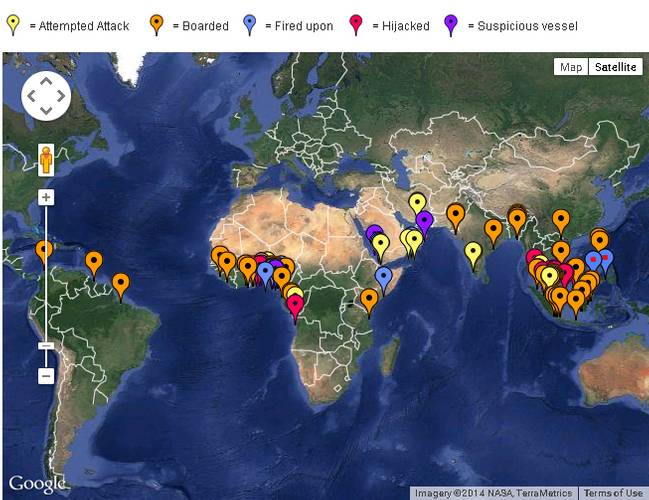Maritime Piracy: Attacks Down, SE Asia Remains Problematic
While the issue of maritime piracy has largely fallen from the public eye, with the rapid evolution of the 24/7/365 news cycle and a never-ending list of new and globally interesting headlines, such as Ebola, there remains concerns of piracy’s effects on the broader maritime market, particularly in SE Asia.
According to the International Chamber of Commerce (ICC) International Maritime Bureau’s (IMB) latest piracy report, maritime pirate attacks globally are down for three years running, but there is a worrisome trend of small tanker hijacks by armed gangs escalating in Southeast Asia.
The latest report, released today at 0700 GMT, reveals a total of 178 incidents so far this year, down from 352 for same period in 2011. In the first nine months of 2014, pirates killed three crew, kidnapped five from their vessels and took 369 seafarers hostage. A total of 17 vessels were hijacked, 124 were boarded and 10 were fired upon. There were 27 further reports of attempted attacks.
“It’s encouraging to see the huge decrease in maritime piracy and armed robbery over the last few years, thanks mainly to international navies deterring pirates off East Africa, and improved onboard security,” said Pottengal Mukundan, IMB Director. “However, there has been a worrying new rise in attacks against small coastal tankers in Southeast Asia. We advise small tankers in particular to remain vigilant in these waters and report all attacks and suspicious small craft to the IMB’s Piracy Reporting Centre.”
Looking at the chart of locations of pirate attacks in the first nine months of 2014, Indonesia is far and away the largest area with 72, followed by Bangladesh (15); Malaysia (15) and Nigeria (13).
Oil Thieves
IMB’s Piracy Reporting Center says gangs of thieves armed with knives and guns are making Southeast Asian waters increasingly dangerous for small tankers carrying products such as gasoil or marine diesel oil. Boarding the ship at sea, pirates hold the crew hostage for a short time while they unload all or part of the cargo, which they then use, or sell locally. Of the six vessels hijacked worldwide in the third quarter of 2014, five were in Southeast Asia.
Looking at the chart of the types of ships attacked in the first nine months of this year, Product Tanker is far and away the largest category with 44 attacks, followed by bulk carrier (34); chemical tanker (22); tanker (21); general cargo (14); containership (13) and LPG Tanker (7).
Indonesia recorded 72 incidents between January and September, including 67 armed robberies and five hijackings. In two separate hijackings off Pulau Bintan in September, 26 crew were taken hostage. Elsewhere in Indonesia 59 vessels were boarded and there were eight attempted attacks. Waters off Pulau Bintan saw more attacks than any other area in the world, with 27 incidents reported. The incidents were low level thefts or attempted thefts from vessels at anchor or berthed. The report commends the efforts taken by the Indonesian Marine Police in addressing the problem areas.
Hostages Remain in Somalia
With just 10 incidents reported so far in Somalia this year, there is a risk that international attention will turn away from the 40 hostages still being held for ransom by suspected Somali pirates.
“Some of those crewmembers have been held captive there for more than four years now, with fading hopes of immediate release,” said Mukundan, adding that seafarers should not underestimate the continuing threat of Somali piracy.
The number of incidents reported in Nigeria has dropped noticeably, down to 13 in the first nine months of 2014, from 29 in the same period last year. Elsewhere in the Gulf of Guinea, Ghana recorded four incidents in 2014 compared with no incidents in 2013. This includes the hijacking of two product tankers – and theft of their cargoes – and a fishing vessel and the taking hostage of 86 crew members.




